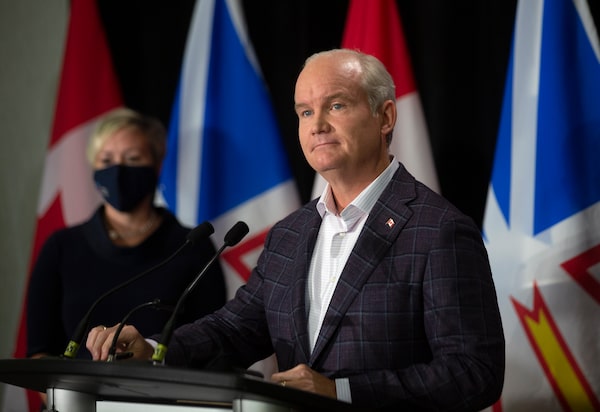
Erin O’Toole takes questions from the media during a press conference in downtown St. John's, N.L. on July 26.Paul Daly/The Canadian Press
Conservative Leader Erin O’Toole pitches his position on free trade as a stand against the failed policies of the Liberal government. In reality, his battle is with the ghosts of his own party.
In a short video posted to Twitter last week, Mr. O’Toole railed against a government “that chases bad trade deals with countries like China,” and the greed of the corporate “power brokers” who support those trade pursuits at the expense of workers at home.
“I believe that the goal of economic policy should be more than just wealth creation,” he said.
His position would make more sense if the current Liberal government had signed, or was pursuing, a trade deal with China. It’s not. It formally abandoned that idea last year, as Canada has grown increasingly critical of Chinese human-rights abuses, and the diplomatic and trade relationships between the two countries have deteriorated.
It would make more sense if the Liberals stood accused of being too cozy with big corporate interests. They’re not. They are frequently viewed as having an anti-business bent, and not without some cause.
No, the last government that was unapologetically pro-business, that placed the expansion of trade agreements at the core of its economic and foreign policy, was the last Conservative government. Mr. O’Toole is bashing away at the foundations of an economic strategy designed and built by Stephen Harper, the most revered figure in his own party.
It was during Mr. Harper’s tenure as prime minister (2006-15) that Canada reached trade agreements with 39 countries – the busiest era for international trade deals in Canadian history. Two of the most important pacts concluded by Mr. Trudeau’s government – with the European Union and the Trans-Pacific Partnership – were initiatives launched and to a great extent negotiated under Mr. Harper’s watch.
“To the trade agreements this government has signed, we’re going to have in the future access to over half of global GDP,” Mr. Harper boasted in the leaders’ debate on the economy during the 2015 election campaign.
By 2013, Mr. Harper had explicitly redefined his government’s foreign policy in terms of pursuing increased trade access to markets in the aid of private-sector business objectives – what the government termed “economic diplomacy.”
That included China, which marked an about-face for Mr. Harper himself. At least early in his tenure as prime minister, Mr. Harper talked tough to China on diplomatic matters while pursuing a pro-business stand on the trade and investment front – only to find that China was not only unwilling to separate the two, but could also harbour very public grudges (its own form of economic diplomacy). Eventually, he backed away from the rhetoric, while increasingly seeking to cultivate the huge Chinese trade opportunities on behalf of Canada’s business community.
Now listen to what Mr. O’Toole has to say about trade with China, and the private-sector interests who would covet it:
“These corporate power brokers care more about their shareholders than their employees. They love trade deals with China that allow them to access cheap labour, and they turn a blind eye to the conduct of the Communist Party,” he said in the video.
Mr. O’Toole’s China stand sounds like a return to early-term Mr. Harper, who, in his first year as prime minister, said he wouldn’t “sell out important Canadian values” regarding China in pursuit of “the almighty dollar.” We have certainly learned over the past several years that China can be a bully in the international arena, and a petulant one at that. Mr. Harper’s attempts to thaw relations with China didn’t get Canada very far, and things have become much, much worse under Mr. Trudeau. It’s hard to see how Mr. O’Toole’s apparent position – to stand on principle, and accept the economic consequences of disengaging with the world’s most important economy – could do much worse.
One question is how Mr. O’Toole’s willingness to single out China might be viewed by Canada’s large Sino-Canadian community, which makes up roughly 5 per cent of the population – but a much bigger share in key urban and suburban centres that could prove pivotal in the next election. There are a lot of first-generation Chinese Canadians who still have close ties to mainland China, including important business ties.
More generally, Mr. O’Toole’s message – challenging the benefits of trade agreements, rebuking big business for pursuing profits – positions the Conservatives in some very strange and unfamiliar territory.
This has long been the party in the corner of private enterprise. In its golden era under Mr. Harper, free trade was the cornerstone of its economic strategy. Now, the party prepares to fight an election with a leader who is openly expressing suspicion of both.
For long-standing party faithful, this is a major break from how they define Canadian Conservative philosophy. If this is the direction Mr. O’Toole is taking the party’s economic platform, he’ll have to climb over the legend of Stephen Harper to get there.
Your time is valuable. Have the Top Business Headlines newsletter conveniently delivered to your inbox in the morning or evening. Sign up today.